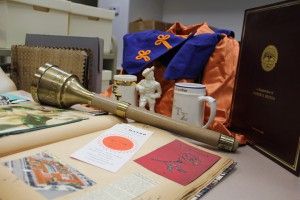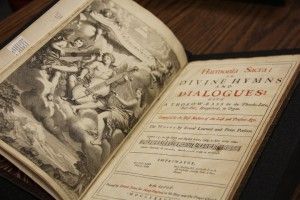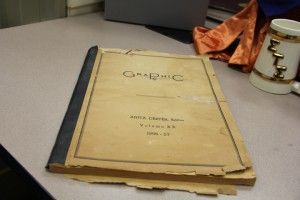The Payson Library archivists have been uncovering previously hidden treasures from the library’s special collections. The archives project, titled “Preserving the Past, Preparing for the Future,” aims to free these pieces of history from ambiguous labels on cardboard storage boxes and document them as part of the University’s contribution to historical scholarship.
“We don’t want these things to stay in storage,” said head of Special Collections and University Archives Melissa Nykanen. We want to get them out so people can use them.”

The project, made possible through a $110,143 grant from the National Historical Publications and Records Commission, focuses on primary sources dealing with the history of Pepperdine, the Churches of Christ and the Malibu area. Though they are only four months into the project, the volumes they have worked through tell the stories of generations of the Pepperdine family.
University materials include committee meeting records and presidential papers, but they do not stop there. Some of their unexpected findings have included a letter from then-President Bill Clinton to President Andrew K. Benton congratulating him on his appointment as university president and an Olympic torch from the 1984 Los Angeles Olympics, for which Pepperdine hosted the water polo tournament.
A set of blueprints and historical documents of early Malibu offer a glimpse into the city’s isolationist struggle. The Rindge family, who owned much of Malibu in the late 19th and early 20th century, consistently worked to preserve it from being developed like the surrounding area. “They found a clause in the law that said if [the city] had their own railroad, the county couldn’t build another one. So they built their own railroad to transport their farm goods, thus preventing it from having one built through it,” said freshman Catie Golitzen, Special Collections student assistant.
Golitzen also found that the Rindges attempted to prevent the building of the highway that would become PCH on family-owned land in Malibu. They were defeated by a U.S. Supreme Court ruling that approved the highway due to the state’s eminent domain rights over the territory.
Archivists have also found personal items to add to the George Pepperdine collection and created an online compilation of documents and photos in the collection. As part of the project, they uncovered a handmade scrapbook recounting George Pepperdine’s trip around the world with his mother. The project also includes forgotten facts about the University founder, like that his first wife died in Hawaii from parrot fever.
Other findings fill in pieces of Church of Christ history. The papers of John Moody McCaleb, a missionary to Japan from 1892 to 1941, reveal much about the missionary group’s struggles and progress. The five-person party included three single women, a feat of relative independence for the time, noted Katie Richardson, archivist for Special Collections and University Archives.
Some of the finest pieces have been a documented part of the library’s collection for some time, though students may not have had much interaction with them. Among the volumes of Special Collections are a French-Latin parallel translation of the “Aeneid” and a 1560 first edition Geneva Bible, the version brought to America by the Pilgrims.
Archivists are also creating finding aids and documents to guide researchers through the collections’ primary sources to increase accessibility.
